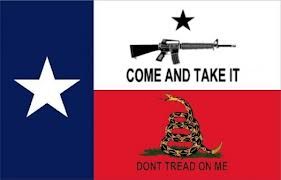gun/control freaks
 Music: The Orb: Bicycles and Tricycles (2004)
Music: The Orb: Bicycles and Tricycles (2004)
The year "opened" with a tinny bang here in central Texas, as it is now legal to openly tote around handguns (it was already legal to open carry long firearms). I haven't noticed anyone actually openly carrying weaponry around town, and I suspect for two reasons. First, I live in a neighborhood that seems relatively disinterested in doing that kind of identity work: while some pockets are "middle class," overall it's an economically disadvantaged area that has shootings every year or so. Threats of gun violence have a chilling effect on brandishing heat, I suspect. Second, and closely related, Texas law enforcement officials have been advancing a reasonable talking-point in local media: licensed folks should have the good sense to know that during "an event," the "bad guys" would take out the open-carry folks first. The advantage of packing heat is that it is concealed, buying the would-be defender the advantage of time and stealth. When cops are urging permit carriers to conceal their firearms, it gets my attention.
 Of course, open-carry advocates are quick to stress businesses can opt-out (many have) and schools are exempt---but concealed-carry is now a thing in schools. Starting in August, students and faculty are legally permitted to pack heat into university classrooms, auditoriums, dormitories, and so on. The primary argument advanced for concealed carry on campus is that a "good guy with a gun" can stop a mass shooting. Many have asked me if I intend to say something about this expanded right on my course syllabi, and I have responded "no." While I personally oppose concealed carry, and while it does frighten me that my deliberately provocative lecturing style might inspire a student toward violence (frontal lobe development, anyone?), it seems to me making an issue of it in my course syllabi will draw unwanted attention: it could, as they say, backfire.
Of course, open-carry advocates are quick to stress businesses can opt-out (many have) and schools are exempt---but concealed-carry is now a thing in schools. Starting in August, students and faculty are legally permitted to pack heat into university classrooms, auditoriums, dormitories, and so on. The primary argument advanced for concealed carry on campus is that a "good guy with a gun" can stop a mass shooting. Many have asked me if I intend to say something about this expanded right on my course syllabi, and I have responded "no." While I personally oppose concealed carry, and while it does frighten me that my deliberately provocative lecturing style might inspire a student toward violence (frontal lobe development, anyone?), it seems to me making an issue of it in my course syllabi will draw unwanted attention: it could, as they say, backfire.
Insofar as the argument that more gun ownership leads to less violence has been routinely disproven, we can conclude this frenzy in favor of weaponry is meeting some other needs. It is commonplace, for example, for those on the side of gun control to characterize the clamoring for more guns as a response to inherently unstable notions of masculinity (hence, this campus response). To me, the most interesting needs are three: (1) it makes the gun carrier feel safe; (2) open carry is really not about guns, but what they represent symbolically; and (3) second amendment politics is a spectacle politics, which is to say open carry legislation is more about the fact that it was passed than the right it expands.
 The second and third needs are yoked at the scene of paranoia and on the staged perception of oppression: "they're taking your hap-penis away!" But the common perception of one's underdog status coupled with paranoid feelings are not reducible to an assailed masculinity in crisis; as I've been arguing over the past two years, these identifications and feelings, when pushed in to the service of a demand, tracks a shift in the structure of public discourse from the neurotic to the psychotic. I do not mean pathology here, but rather, refer to a certain patterned structure of the collective psyche: in the 1950s, authority was a real thing that folks believed in; Tip O'Neill still worked with Ronald Reagan, folks in general had a feeling of inner-limit or limitation, that modicum of insecurity that paves the way for trust. Today, authority has fragmented into discursive encampments. Nasty Twitter battles and hateful Facebook status updates are of a piece with righteousness regarding the second amendment: insecurity, instead of leading to the risk of trust, is now expressed in what amounts to a tantrum. That kind of behavior---so ridiculously embodied in the leading Republican presidential candidate---is psychotic in character because it betrays an inability to accept limitation or the answer "no."
The second and third needs are yoked at the scene of paranoia and on the staged perception of oppression: "they're taking your hap-penis away!" But the common perception of one's underdog status coupled with paranoid feelings are not reducible to an assailed masculinity in crisis; as I've been arguing over the past two years, these identifications and feelings, when pushed in to the service of a demand, tracks a shift in the structure of public discourse from the neurotic to the psychotic. I do not mean pathology here, but rather, refer to a certain patterned structure of the collective psyche: in the 1950s, authority was a real thing that folks believed in; Tip O'Neill still worked with Ronald Reagan, folks in general had a feeling of inner-limit or limitation, that modicum of insecurity that paves the way for trust. Today, authority has fragmented into discursive encampments. Nasty Twitter battles and hateful Facebook status updates are of a piece with righteousness regarding the second amendment: insecurity, instead of leading to the risk of trust, is now expressed in what amounts to a tantrum. That kind of behavior---so ridiculously embodied in the leading Republican presidential candidate---is psychotic in character because it betrays an inability to accept limitation or the answer "no."
Of course, I am characterizing recent political discourse as psychotic. There is good reason to think, however, that when we talk about the rhetors of such psychotic discourse we may need the category of perversion. I'm currently working on a pair of essays that try to lay this out vis-à-vis genre. Stay tuned.
Meanwhile, a number of my colleagues in rhetorical studies have been observing, for some years, that second amendment righteousness is really about identity. In a recent essay on the second amendment, Laura J. Collins argues that gun rights fanaticism represents a "demand politics" that is akin to an addiction to an "outsider" identity and sense of victimage. Through a complex yet succinct analysis she traces how the National Rifle Association transformed from a gun safety civic club into an aggressive, political faction and the parallel transformation of the judicial interpretation of the second amendment. In this view, a "demand" is something akin to what a toddler makes: no matter how many times you give the tyke a cookie, it will never be enough because it's not about the cookie. In the end, all demands are demands for love, but they can be sublimated into political movements: the civil rights movement, for example, is a form of demand politics (the demand for recognition). The trouble, as Collins spells out, is that demands are addictive and if that is the only thing one seeks (in a politics or in personal life), demands trend in the end toward violence. For this reason, the gun lobby has become increasingly intolerant, aggressive, and mean. For example, Texas has open carry now, but rather than celebrate that fact, the gun lobby remains angry about California's ban.
In response to Collins, Brett Lunceford refigures her reading in relation to Richard B. Gregg's conception of the "ego function" of social movement rhetoric (again, it's about identity as much as "cause"). Mike Hogan and Craig Rood respond by suggesting, in addition to psychology, the impasse over guns is also a result of poor deliberation and political inaction. For my part, agreeing with Collins and Christian Lundberg, I attempt to locate the celebration and enjoyment (as in, jouissance) of the failures of political sublimation in a way that is somewhat in keeping with Hogan and Rood's take on the failures of public policy: gun law and policy is not adjudicated with argument, it's felt (you can download my response here). Feelings are all that are important; it's no longer "I have a right to an opinion," but rather, "I have a right to my feelings, and they are hurt!"
 Trump's ridiculous ambition to build a "big wall" is a plan taken directly from Pink Floyd's most popular double-album (also about feelings, parents, and weapons). "The Wall" can be appealing only insofar as arguments are irrelevant. Most arguments depend on an informal logic that links "evidence" to a "claim" in a more or less sound manner (the "warrant")---which is the truth upon which all deliberation rests. Arguments require the authority of truth, at some level. Brett, Mike, Craig and I agree with Collins that the irrational, almost adolescent tantrums about guns from those right of center rest on the right to one's feelings.
Trump's ridiculous ambition to build a "big wall" is a plan taken directly from Pink Floyd's most popular double-album (also about feelings, parents, and weapons). "The Wall" can be appealing only insofar as arguments are irrelevant. Most arguments depend on an informal logic that links "evidence" to a "claim" in a more or less sound manner (the "warrant")---which is the truth upon which all deliberation rests. Arguments require the authority of truth, at some level. Brett, Mike, Craig and I agree with Collins that the irrational, almost adolescent tantrums about guns from those right of center rest on the right to one's feelings.
What the gun/control freaks help us to see is that affect (and rhetorical) studies need a deeper engagement with bad feelings, particularly those yoked to a righteous sense of individualism (as the toddler screams, "MINE!"). Also, we have to start paying attention to a "bad feeling" that is increasingly commonplace since Nine-eleven: envy about someone else's depression, anger, trauma, or grief.
As many of us who study persuasion know, however, influencing another person is a form of suggestion, a kind of wakeful, hypnogogic craft. Which is to say our feelings are shared, and our emotions, well, they've never really "our own" to begin with.